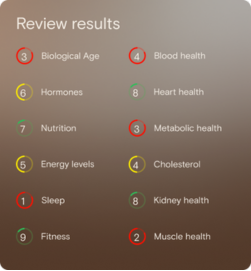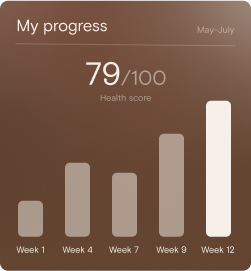What is the calcium test?
It’s a blood test that measures the level of calcium circulating in your bloodstream in mmol/L. This helps you understand how your body balances minerals involved in muscle activity, nerve communication, and metabolic processes.
Why does it matter for long-term health and wellbeing?
Calcium supports functions that influence strength, stability, and day-to-day energy. Keeping levels within range, as seen on a calcium blood test, helps maintain balanced metabolic activity and contributes to long-term vitality.
What’s an optimal level of calcium?
- Optimal range (Vively): 2.1–2.6 mmol/L
- Typical Australian laboratory reference range: 2.1–2.6 mmol/L
What influences calcium levels?
Sun exposure patterns, dietary calcium intake, hydration, physical activity, vitamin D status, and overall mineral balance all play a role. Calcium is also closely connected to other markers such as PTH, vitamin D, and kidney-related indicators.
What does it mean if calcium is outside the optimal range?
Results outside the optimal range may suggest that your body isn’t maintaining mineral balance as efficiently as it could. This can offer useful insight into nutrition, lifestyle habits, and how your body regulates minerals on a day-to-day basis.
How can I support healthy calcium levels?
Focus on nutrient-rich foods containing calcium, balanced vitamin D exposure, regular movement to support bone turnover, and hydration. Tracking calcium alongside related markers helps you see how these choices influence your long-term balance.
This information is provided for general health and wellness purposes only and does not replace medical advice.
FAQs
What is a calcium score test?
What is a calcium score test is a common question, but it refers to a heart scan rather than a blood test. A calcium score test uses CT imaging to look for calcium deposits in the coronary arteries, while a standard calcium blood test measures the level of calcium circulating in your bloodstream for metabolic balance.
What is a coronary calcium score test used for?
A coronary calcium score test is used to assess calcium buildup in the arteries of the heart as part of cardiovascular risk assessment. It measures arterial calcification, not blood calcium levels, so the two tests provide different types of information.
What is an ionized calcium lab test?
An ionized calcium lab test measures the free, biologically active form of calcium in the blood. It is sometimes used when more detailed assessment is needed, but for general metabolic monitoring, total calcium testing is usually sufficient.
References
- Australian Institute of Health and Welfare. (2023). Nutrition across the life stages.
- National Health and Medical Research Council. (2013). Australian dietary guidelines.
- Healthdirect Australia. (2023). Calcium blood test.
- Royal College of Pathologists of Australasia. (2024). Calcium: Reference intervals and testing guidance.




















.png)


.svg)

